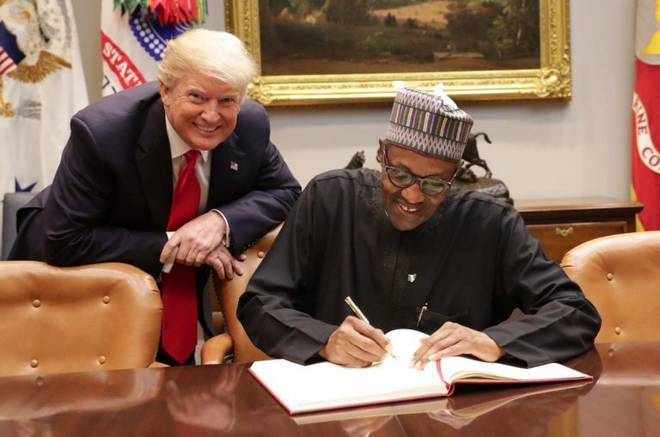
President Muhammadu Buhari’s supporters are frothing at the mouth with impotent rage because the Financial Times reported President Donald Trump to have told his aides “he never wanted to meet someone so lifeless” like Buhari again.
The same Buhari supporters who are calling attention to Trump’s moral foibles and erratic personality to impeach the validity of his opinion on Buhari actually praised Trump and even affectionately called him “Baba Trump” (à la “Baba Buhari”) when Buhari’s social media aide by the name of Lauretta Onochie fabricated a transparently fake and hilariously error-ridden quote of Trump putatively praising Buhari’s “integrity” and “anti-corruption” fight.
“I stand with you the number one African president,” the fake Onochie-generated quote reported Trump to have said of Buhari in private. “I support you my fellow president. Your integrity is second to none. I am at your back [sic] in spirit, physical and in faith [sic]. Go on with your anti corruption [sic] fight against crooks in your country. I support you President Muhammadu Buhari. God is also with you.”
In my May 13, 2018 grammar column titled: “Nigerian and American English Clash in Fake Pro-Buhari Trump Quotes,” I showed that the quote was decidedly fictitious, but Buharists insisted it was real and said I dismissed it as fake because I “hate” Buhari and couldn’t live with the fact that Trump thought highly of Buhari.
Buhari’s media aides also bragged on social media about Buhari being the “first African president” to be invited to the Trump White House-as if being invited to the White House was anything other than a mere self-interested, strategic diplomatic courtesy on the part of the Trump White House. (Egypt’s president was actually the first African president invited to the White House).
So the Buhari media team-and the president’s supporters set themselves up for the anger and let down they feel over Trump’s admittedly unkind dig at Buhari. It’s hypocritical to exult in Trump’s putative praises and approval of Buhari and then turn around to insult the same Trump for his opinion on Buhari that ruptures your presumptions.
If you so desperately desired the approval of Trump that you felt obligated to intentionally cook up fake quotes and attribute to him in order to shore up notions of the “integrity” of Buhari, you can’t dismiss the selfsame Trump’s condemnation of Buhari as inconsequential and not come across as laughably infantile in your hypocrisy. It cuts both ways: if you think Trump’s positive opinion of Buhari is worthy, his negative opinion of Buhari can’t be worthless.
At any rate, what Trump said about Buhari isn’t fresh information. By “lifeless,” Trump meant Buhari was dreary, laid back, lacking in enthusiasm, passion, and energy. This is consistent with what I wrote in my column of May 5, 2018 titled “Buhari’s American Visit: The High and Low Points.”
“My guess is that Buhari was tongue-tied with excessive restraint because he was overly scripted,” I wrote. “He appeared to be intimidated by Trump who has a reputation for antagonistic brusqueness. Buhari probably also didn’t want to risk being publicly tongue-lashed and humiliated by Trump, so he towed the line of least resistance by being unnaturally meek.”That’s many words to convey the sense that he was “lifeless.”
But why does what Trump say about Buhari matter? Buhari is the president of a sovereign country like Trump is. What Trump thinks of another president is irrelevant, particularly because the lone person Trump thinks highly of is Trump. The only reason this is a subject of national conversation is that we are hostages to what I have called xenophilia, that is, the irrational, unjustified, inferiority-driven love for the foreign and a corresponding sense of low national self-worth.
Buhari, for instance, is an unapologetic Anglophile. When he won election in 2015, the first place he flew to was England. It’s also where all his children went to school. It’s where he goes to treat even his littlest ailments “since 1978 when I was in Petroleum,” according to a transcript of his interaction with Nigerians in London, as reported by the Punch of February 6, 2016.
The Amerophilia of the late Umar Musa Yar’adua and Goodluck Jonathan were also noteworthy. When Yar’adua was elected president, he visited America and told George Bush that his visit to the White House was “a rare opportunity” and a “moment that I will never forget in my life.” I know of no elected president of a sovereign country who ever said that to another elected president.
When Jonathan was made acting president in 2010, he sought a stamp of legitimacy for his acting presidency by visiting America. He also gave more weight to the empty diplomatic compliments of Obama than he did to the genuine feelings of the people he governed-just like Buhari and his supporters who are always fishing for endorsements of Buhari’s “integrity” in foreign soils. The Vanguard of September 26, 2011, for instance, reported Jonathan as saying “I just got back from the US. The President of America is like the president of the world because it is the most powerful country…. Obama, when he spoke, commended Nigeria but back home we are being abused.”
As I pointed out in my March 23, 2013 article titled, “State Pardon: 5 Reasons Jonathan Can’t Appeal to Sovereignty,” “all post-independence Nigerian governments, with the exception of the late General Murtala Muhammed military regime, actively and slavishly seek the approval of Washington almost as a state policy.”
And I said of former president Goodluck Jonathan on March 23, 2013 that, “He accords more value to the empty extolments of the White House than he does to the genuine judgment of his administration by the people who elected him.” This is also true of Buhari.
You can’t go to another country to invoke the social and symbolic basis of your legitimacy-and even tout invitation to the country as a badge of honor and as a bragging right- and turn around to accuse that same country of insulting your president or of undermining your sovereignty when it tells you something you don’t want to hear.
When Samuel Johnson, the self-taught pioneer of English lexicography, said, “Patriotism is the last refuge of a scoundrel,” he had in mind people like Buhari supporters who are lashing out at Trump and proclaiming empty patriotism.
Johnson’s statement, made on April 7, 1775, wasn’t a denunciation of patriotism as such; it was only a critique of false patriotism, of opportunistic, politically convenient patriotism, such as the kind being displayed now in the wake of Trump’s reported gibe at Buhari. If you believed Trump’s judgement that Buhari has “integrity” (even though he actually never said that) you should have no difficulty believing his description of him as “lifeless” (which he probably also didn’t say).

 Join Daily Trust WhatsApp Community For Quick Access To News and Happenings Around You.
Join Daily Trust WhatsApp Community For Quick Access To News and Happenings Around You.


